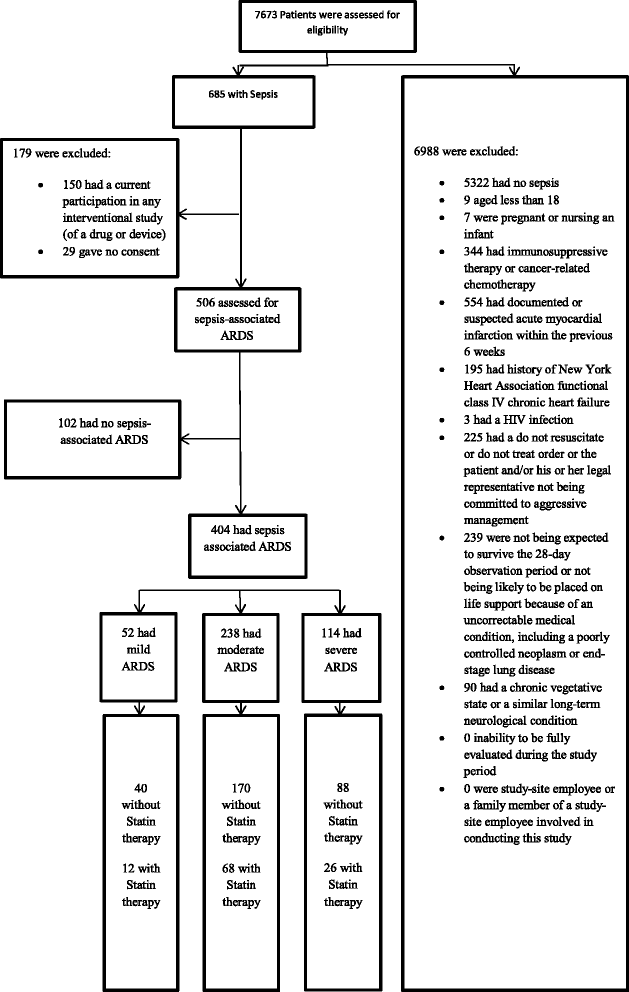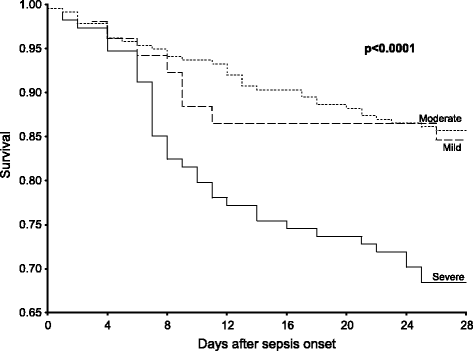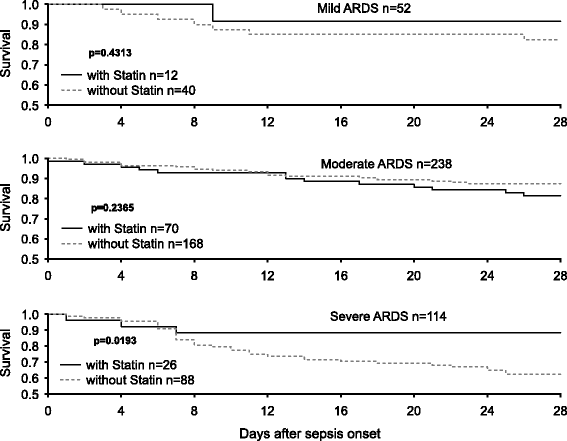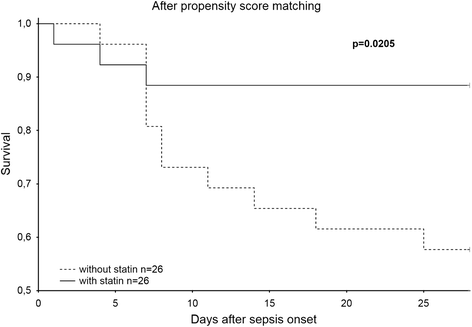Impact of statin therapy on mortality in patients with sepsis-associated acute respiratory distress syndrome (ARDS) depends on ARDS severity: a prospective observational cohort study
- PMID: 26033076
- PMCID: PMC4462111
- DOI: 10.1186/s12916-015-0368-6
Impact of statin therapy on mortality in patients with sepsis-associated acute respiratory distress syndrome (ARDS) depends on ARDS severity: a prospective observational cohort study
Abstract
Background: Previous investigations have presumed a potential therapeutic effect of statin therapy in patients with acute respiratory distress syndrome (ARDS). Statins are expected to attenuate inflammation in the lungs of patients with ARDS due to their anti-inflammatory effects. Clinical investigations of the role of statin therapy have revealed contradictory results. This study aimed to investigate whether pretreatment and continuous therapy with statins in patients with sepsis-associated ARDS are associated with 28-day survival according to disease severity (mild, moderate, or severe).
Methods: Patients with sepsis-associated ARDS from the surgical intensive care were enrolled in this prospective observational investigation. ARDS was classified into three groups (mild, moderate, and severe); 28-day mortality was recorded as the primary outcome variable and organ failure was recorded as secondary outcome variable. Sequential Organ Failure Assessment scores and the requirements for organ support were evaluated throughout the observational period to assess organ failure.
Results: 404 patients with sepsis-associated ARDS were enrolled in this investigation. The distribution of the ARDS subgroups was 13 %, 59 %, and 28 % for mild, moderate, and severe disease, respectively. Statin therapy improved 28-day survival exclusively in the patients with severe ARDS compared with patients without statin therapy (88.5 % and 62.5 %, respectively; P = 0.0193). To exclude the effects of several confounders, we performed multivariate Cox regression analysis, which showed that statin therapy remained a significant covariate for mortality (hazard ratio, 5.46; 95 % CI, 1.38-21.70; P = 0.0156). Moreover, after carrying a propensity score-matching in the severe ARDS cohort, Kaplan-Meier survival analysis confirmed the improved 28-day survival among patients with statin therapy (P = 0.0205). Patients with severe ARDS who received statin therapy had significantly more vasopressor-free days compared with those without statin therapy (13 ± 7 and 9 ± 7, respectively; P = 0.0034), and they also required less extracorporeal membrane oxygenation (ECMO) therapy and had more ECMO-free days (18 ± 9 and 15 ± 9, respectively; P = 0.0873).
Conclusions: This investigation suggests a beneficial effect of continuous statin therapy in patients with severe sepsis-associated ARDS and a history of prior statin therapy. Further study is warranted to elucidate this potential effect.
Figures




Similar articles
-
Prior statin therapy and 30-day mortality in South Korean patients with acute respiratory distress syndrome.Acta Anaesthesiol Scand. 2021 Feb;65(2):236-243. doi: 10.1111/aas.13715. Epub 2020 Oct 8. Acta Anaesthesiol Scand. 2021. PMID: 32979217
-
Statin therapy as prevention against development of acute respiratory distress syndrome: an observational study.Crit Care Med. 2012 May;40(5):1470-7. doi: 10.1097/CCM.0b013e3182416d7a. Crit Care Med. 2012. PMID: 22430234 Free PMC article.
-
[Clinical study of early use of neuromuscular blocking agents in patients with severe sepsis and acute respiratory distress syndrome].Zhonghua Wei Zhong Bing Ji Jiu Yi Xue. 2014 May;26(5):325-9. doi: 10.3760/cma.j.issn.2095-4352.2014.05.008. Zhonghua Wei Zhong Bing Ji Jiu Yi Xue. 2014. PMID: 24809261 Clinical Trial. Chinese.
-
Failure of statins in ARDS: the quest for the Holy Grail continues.Minerva Anestesiol. 2016 Nov;82(11):1230-1234. Epub 2016 May 27. Minerva Anestesiol. 2016. PMID: 27232279 Review.
-
Impact of statins on ALI/ARDS: A meta-analysis.Pulm Pharmacol Ther. 2016 Aug;39:85-91. doi: 10.1016/j.pupt.2016.06.010. Epub 2016 Jun 29. Pulm Pharmacol Ther. 2016. PMID: 27373439 Review.
Cited by
-
Understanding the role of neutrophils in chronic inflammatory airway disease.F1000Res. 2019 Apr 26;8:F1000 Faculty Rev-557. doi: 10.12688/f1000research.18411.1. eCollection 2019. F1000Res. 2019. PMID: 31069060 Free PMC article. Review.
-
Association between antecedent statin use and decreased mortality in hospitalized patients with COVID-19.Nat Commun. 2021 Feb 26;12(1):1325. doi: 10.1038/s41467-021-21553-1. Nat Commun. 2021. PMID: 33637713 Free PMC article.
-
RhoA S-nitrosylation as a regulatory mechanism influencing endothelial barrier function in response to G+-bacterial toxins.Biochem Pharmacol. 2017 Mar 1;127:34-45. doi: 10.1016/j.bcp.2016.12.014. Epub 2016 Dec 22. Biochem Pharmacol. 2017. PMID: 28017778 Free PMC article.
-
Exacerbation of Ventilation-Induced Lung Injury and Inflammation in Preterm Lambs by High-Dose Nanoparticles.Sci Rep. 2017 Oct 31;7(1):14704. doi: 10.1038/s41598-017-13113-9. Sci Rep. 2017. PMID: 29089616 Free PMC article.
-
Influence of rosuvastatin treatment on cerebral inflammation and nitro-oxidative stress in experimental lung injury in pigs.BMC Anesthesiol. 2021 Sep 13;21(1):224. doi: 10.1186/s12871-021-01436-0. BMC Anesthesiol. 2021. PMID: 34517845 Free PMC article.
References
Publication types
MeSH terms
Substances
LinkOut - more resources
Full Text Sources
Other Literature Sources
Medical

